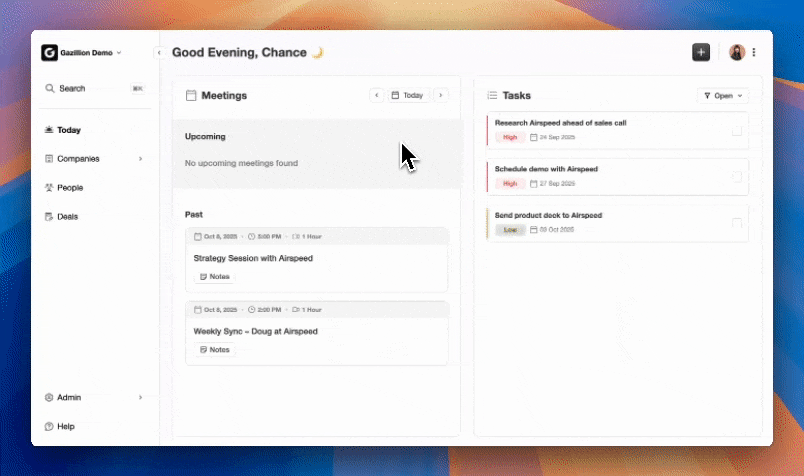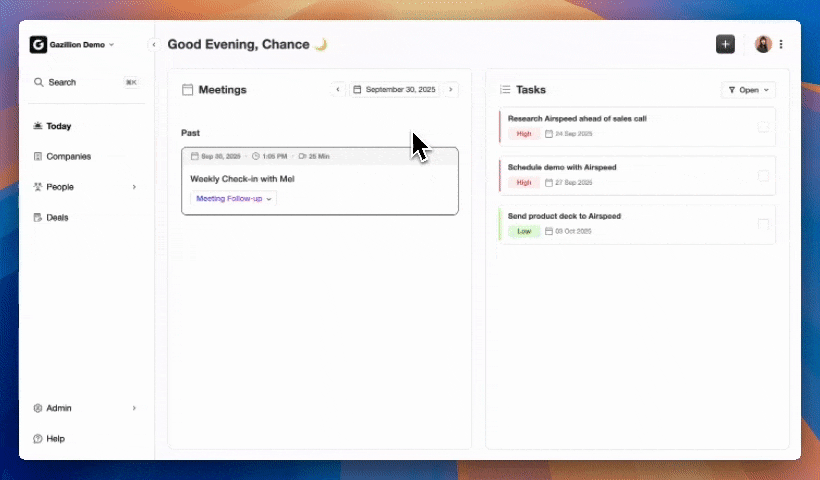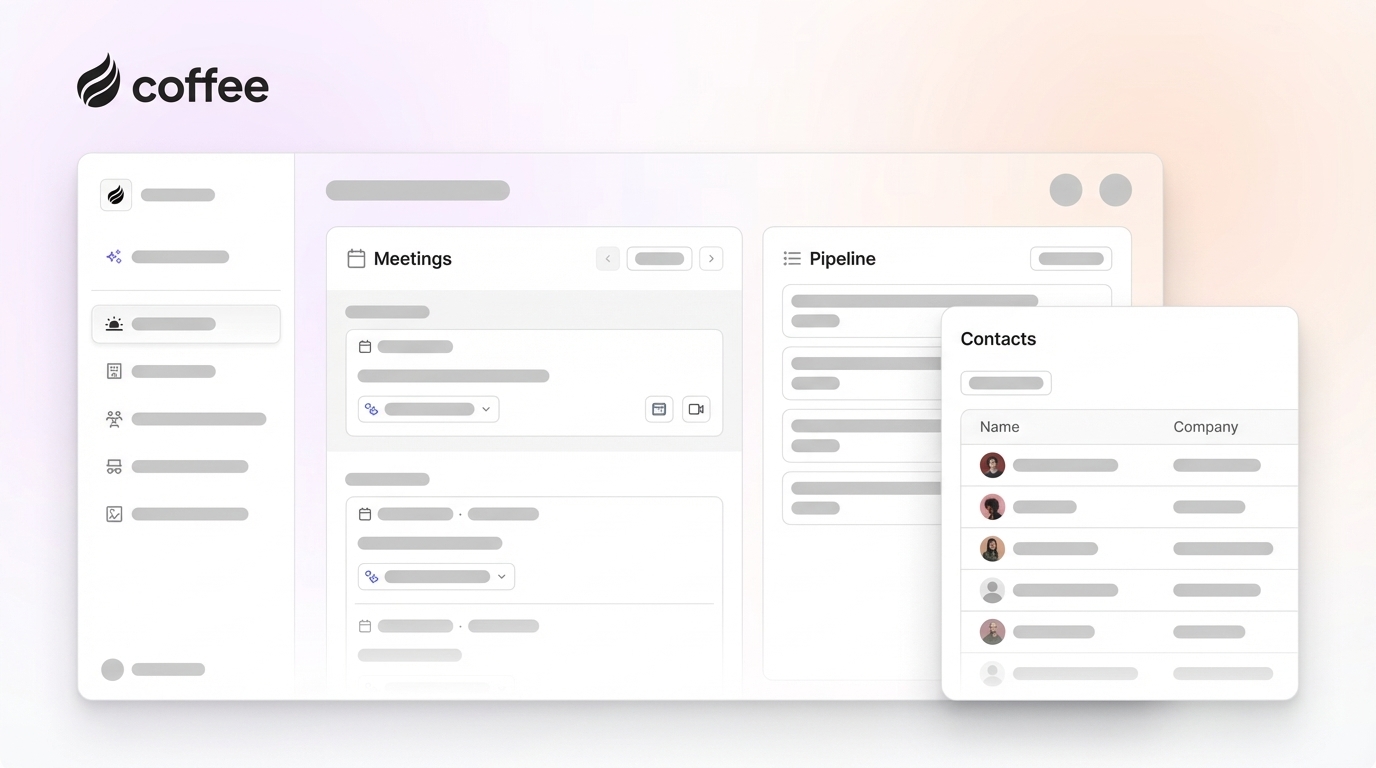Key Takeaways
- B2B sales in 2026 involve larger buying groups and more information sources, so scattered tools and manual processes limit growth.
- Effective sales enablement platforms automate data capture, enrichment, content access, meetings, and forecasting in one unified system.
- Conversation intelligence and real-time pipeline visibility convert everyday sales activity into coaching insights and accurate forecasts.
- User-friendly design and workflow automation drive higher adoption, which improves data quality and decision-making across the team.
- Coffee’s AI Agent brings these capabilities into a single platform so teams can reduce tools and increase revenue, and you can get started with Coffee quickly.
The State of Sales Enablement in 2026: Why Traditional Approaches Fall Short
B2B sales cycles in 2026 involve complex buying groups, with committees of up to 10 stakeholders who each consult 4–5 information sources before purchase decisions.
Tool sprawl adds friction for these teams. Nearly seven in 10 reps feel overwhelmed by the number of tools they use, and 90% of sales organizations plan to consolidate their tech stack, while many teams still juggle close to 10 tools during the sales process.
Manual data entry keeps this stack from delivering value. Reps often skip updating CRMs when forced to log every interaction, which leads to incomplete records and the familiar “garbage in, garbage out” problem that weakens reporting, coaching, and forecasting.
Smaller organizations feel this even more. Many sales leaders lack time to build playbooks or deliver consistent coaching even when they know what works, and only 40% of C-level leaders can accurately pinpoint rep strengths and weaknesses for targeted training. Sales enablement tools must close these gaps, not add to them.
Empowering Your Sales Force: 7 Critical Sales Enablement Tool Capabilities for 2026
1. Intelligent, Automated Data Capture and Entry
Automated data capture protects productivity by removing low-value admin work. When a platform records emails, meetings, and notes in the background, reps can focus on prospecting and closing instead of typing.
Modern tools should create and update contacts and companies from email and calendar activity, associate every interaction with the right record, and keep histories current without rep effort. Clean, real-time data then supports more accurate reporting and faster handoffs.
The Coffee Agent automates this entire layer by scanning emails and calendars, creating contacts and companies, and attaching every note and interaction to the correct record. Many teams see 8–12 hours per rep each week shift from admin tasks to selling. Get started with automated data capture today.

2. AI-Powered, Real-Time Data Enrichment
Rich context turns a basic contact list into a targeted pipeline. Reps need accurate titles, company details, and signals like funding or tech stack to tailor outreach and qualify quickly.
Sales enablement tools should enrich contacts and accounts with items such as job titles, funding rounds, LinkedIn profiles, hierarchy data, and technology indicators as soon as they enter the system.
The Coffee Agent augments records using licensed data partners, adding titles, funding data, and LinkedIn profiles so teams can skip separate enrichment tools and move directly into relevant, personalized outreach.
3. Unified Content Management and Contextual Delivery
Easy access to relevant content helps reps respond quickly and consistently. Many frontline sellers still lack enough useful content support, or they spend time searching across shared drives and outdated folders.
Effective platforms recommend the right decks, case studies, and email templates based on deal stage, industry, and persona. Teams using sales enablement tools often report higher win rates and faster cycles because content is easier to find and use.
Coffee does not replace content platforms, but its accurate CRM data from the Agent supports integrations that improve content recommendations, so reps see more relevant materials at the right moment.
4. Advanced Conversational Intelligence and Meeting Orchestration
Structured insight from sales calls helps teams refine messaging and improve coaching. Teams that apply AI to sales activity are several times more likely to meet revenue targets, partly because they learn from every conversation.
Strong sales enablement tools record, transcribe, and analyze calls automatically, highlight common objections and competitor mentions, and recommend follow-up actions. The same system should prepare reps before meetings and update CRM records after meetings without extra work.
The Coffee Agent includes a meeting bot that joins calls, records and transcribes them, creates summaries, identifies next steps, and drafts follow-up emails for review. It also prepares reps with briefings on attendees and past interactions so meetings stay focused and consistent.

5. Real-Time Pipeline Visibility and Forecasting Intelligence
Reliable forecasts depend on current, accurate pipeline data. Manual updates introduce blind spots that cause missed risks and surprises at the end of the quarter.
Modern platforms track deal changes automatically, monitor velocity, and surface risk patterns so leaders can coach earlier. Visual comparisons of pipeline over time replace spreadsheet exports, and AI highlights deals that need attention.
AI-driven recommendations now help leaders refine programs and forecasting approaches when they can rely on the underlying data.
The Coffee Agent improves this view with accurate inputs and a Pipeline Compare feature that shows week-over-week movements, new deals, and stalled opportunities. Pipeline reviews shift from manual data collection to focused strategy discussions. Get started with intelligent pipeline management.

6. Consolidated Tech Stack and Workflow Automation
Consolidated tools reduce complexity, cost, and context switching. About 90% of sales organizations now plan to consolidate their tech stack as leaders recognize that unified, end-to-end platforms work better than scattered point solutions.
Modern sales enablement tools should combine data enrichment, call recording, pipeline analysis, and forecasting workflows in one interface instead of pushing teams into separate logins and manual integrations.
The Coffee Agent consolidates many capabilities that often sit across CRMs, enrichment tools, call recorders, and forecasting add-ons. Teams gain a single source of truth, lower vendor costs, and simpler onboarding.
7. User-Centric Design and High Adoption Rates
High adoption is the outcome of a tool that genuinely helps reps do their jobs. Legacy CRMs often feel like chores, which leads to low usage, spotty data, and weak insight.
Sales enablement platforms should act as co-pilots that anticipate needs, automate repetitive work, and surface practical recommendations. Trends from 2025 highlighted AI and automation because these features lower the manual input required from reps.
The Coffee Agent functions as that co-pilot by handling data entry and other busywork in the background. Reps benefit immediately, so they keep using the system, and leaders gain consistently clean, reliable data.
The Coffee Agent: A Modern Approach to Sales Enablement
Coffee shifts sales enablement from passive software to an active AI Agent that works alongside your team. Instead of asking reps to maintain a database, Coffee captures activity, enriches records, orchestrates meetings, and keeps your pipeline accurate.
Key strengths include automated data capture and enrichment for “good data in,” meeting support that turns conversations into clear next steps, pipeline intelligence built on trustworthy data, and tech stack consolidation that reduces tool overload while maintaining a user experience reps rely on.
Comparison Table: Coffee vs. Legacy CRMs vs. Fragmented Point Solutions
|
Feature Category |
Coffee (Agent-Led) |
Legacy CRMs (e.g., Salesforce) |
Fragmented Point Solutions |
|
Data Entry |
Automated by an AI Agent |
Manual, rep burden |
Not applicable |
|
Data Quality |
High, based on captured activity |
Variable, depends on human input |
Partial, enrichment only |
|
Tech Stack |
Consolidated in one platform |
Dispersed, heavy integration needs |
Dispersed across vendors |
|
User Experience |
Co-pilot that reps depend on |
Administrative chore |
Varies by tool |
Teams that want an enablement platform that actively supports selling, not just storage, can get started with Coffee and its AI Agent in a few steps.
Conclusion: Moving to Active, Agent-Led Sales Enablement
Effective sales enablement in 2026 requires more than storage and reports. Teams need tools that automate the work around data, content, meetings, and pipeline insights so reps can prioritize selling.
Coffee delivers these seven critical capabilities through its AI Agent, from automated data capture and enrichment to meeting orchestration and pipeline analysis. Sales teams that want a cleaner stack, better data, and more time to sell can get started with Coffee and make their CRM a practical competitive advantage.
Frequently Asked Questions (FAQ) about Sales Enablement Tools
How does a sales enablement tool like Coffee impact sales productivity in 2026?
Sales productivity in 2026 improves when admin work decreases. Coffee’s Agent automates data entry and enrichment from emails, calendars, and calls so reps can reclaim 8–12 hours per week for prospecting, relationship building, and closing, while data quality remains high.
Can a sales enablement tool consolidate an existing sales tech stack?
Modern platforms like Coffee consolidate core capabilities, including data enrichment, conversation intelligence, and pipeline management, into one environment. This consolidation reduces training time, lowers software costs, and gives teams a single place to work and measure performance.
How does a sales enablement tool improve data quality and forecasting accuracy?
The Coffee Agent captures and structures interaction data automatically, instead of relying on manual updates. Emails, calendar events, and call transcripts feed directly into accounts and opportunities, which keeps pipeline data current. Features like Pipeline Compare then provide reliable visibility into progression and risk.
Is data security a concern with an AI-powered sales enablement tool?
Data security remains central for AI-powered tools. Coffee maintains SOC 2 Type 2 and GDPR compliance, and data processed by the Coffee Agent is not used to train public AI models, so sensitive sales information stays private to your organization.
What makes Coffee different from traditional CRM systems for sales enablement?
Coffee uses an autonomous Agent that actively works on behalf of sales professionals. Traditional CRMs operate as static databases that depend on manual upkeep. Coffee’s Agent captures interactions, enriches records, organizes meetings, and surfaces insights automatically, turning the system into an operational assistant instead of an administrative requirement.
